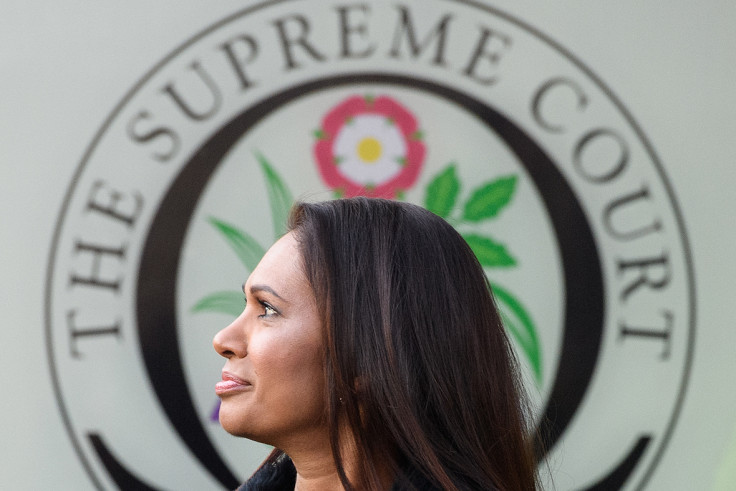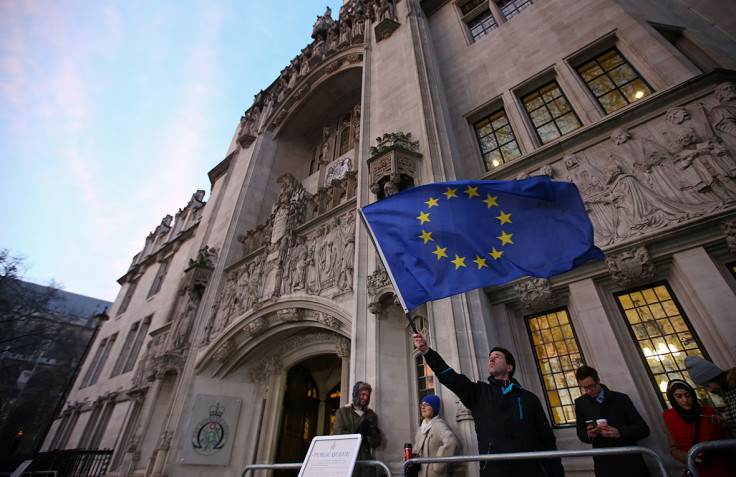Theresa May loses Article 50 ruling and must consult with MPs before triggering Brexit
Judges rule by 8-3 majority that the Government cannot leave the EU without consulting with Parliament first.
Theresa May will have to ask MPs to vote before she can trigger Article 50 and begin the formal process of leaving the EU after the government lost its Supreme Court appeal.
The judges' court ruled by a majority of eight to three that the prime minister does not have inherited prerogative powers to trigger Article 50 and start the Brexit process without consulting Parliament.
While it is unlikely MPs will vote against Brexit entirely, the decision from the Supreme Court means that May's previous plans to begin the two-year process of leaving the EU by March 2017 could now be delayed. The decision could also hamper May's future negotiations on how to leave the EU.
The court also ruled that the government does not need to consult the Scottish parliament or other devolved assemblies in Northern Ireland or Wales in order to trigger Brexit.
The Government is now expected to swiftly publish a bill which will allow MPs to debate Brexit in order to minimise any potential disruption from the Supreme Court's decision. Downing Street insisted the ruling "does nothing" to change the timetable for exiting the EU.
A spokesperson added: "The British people voted to leave the EU, and the Government will deliver on their verdict – triggering Article 50, as planned, by the end of March. Today's ruling does nothing to change that.
"It's important to remember that Parliament backed the referendum by a margin of six to one and has already indicated its support for getting on with the process of exit to the timetable we have set out."
Announcing the decision, President of the Supreme Court Lord Neuberger said: "The question before this court concerns the steps which are required as a matter of UK domestic law before the process of leaving the European Union can be initiated.
Any change in the law must be made in the only way permitted by the UK constitution... to proceed otherwise would be a breach of constitutional principles stretching back many centuries.
"It is worth emphasising that nobody has suggested that this is an inappropriate issue for the courts to determine. It is also worth emphasising that this case has nothing to do with issues such as the wisdom of the decision to withdraw from the European Union, the terms of withdrawal, the timetable or arrangements for withdrawal, or the details of any future relationship with the European Union. Those are all political issues which are matters for ministers and Parliament to resolve."
In a summary of the decision, the judges ruled: "The Supreme Court by a majority of eight to three dismisses the Secretary of State's appeal (Lord Neuberger, Lady Hale, Lord Mance, Lord Kerr, Lord Clarke, Lord Wilson, Lord Sumption and Lord Hodge in the majority with Lord Reed, Lord Carnwath and Lord Hughes dissenting).
"In a joint judgment of the majority, the Supreme Court holds that an Act of Parliament is required to authorise ministers to give notice of the decision of the UK to withdraw from the European Union. Each of the dissenting justices gives a separate judgment. On the devolution issues, the court unanimously concludes that neither section one nor section 75 of the NIA is of assistance in this case, and that the Sewel Convention does not give rise to a legally enforceable obligation."
Neuberger added: "The Act of Parliament which established it [the referendum] did not say what should happen as a result, so any change in the law to give effect to the referendum must be made in the only way permitted by the UK constitution... to proceed otherwise would be a breach of constitutional principles stretching back many centuries."

The Government launched its appeal against a previous Hugh Court ruling in November that said May must consult MPs before triggering Article 50 following an appeal by a campaign group led by investment manager Gina Miller.
In the aftermath of the High Court ruling, Miller was subjected to racial abuse online, with the three judges who made the ruling stating May must consult MPs before triggering Article 50 described as "enemies of the people".
During her speech on Brexit negotiations earlier this month, May promised that MPs will be allowed to vote on the final deal between the UK and EU before they leave.
Responding the ruling, Justice Secretary Elizabeth Truss said: "Our independent judiciary is the cornerstone of the rule of law and is vital to our constitution and our freedoms. The reputation of our judiciary is unrivalled the world over, and our Supreme Court justices are people of integrity and impartiality.
"While we may not always agree with judgments, it is a fundamental part of any thriving democracy that legal process is followed. The Government has been clear that it will respect the decision of the court."

© Copyright IBTimes 2024. All rights reserved.






